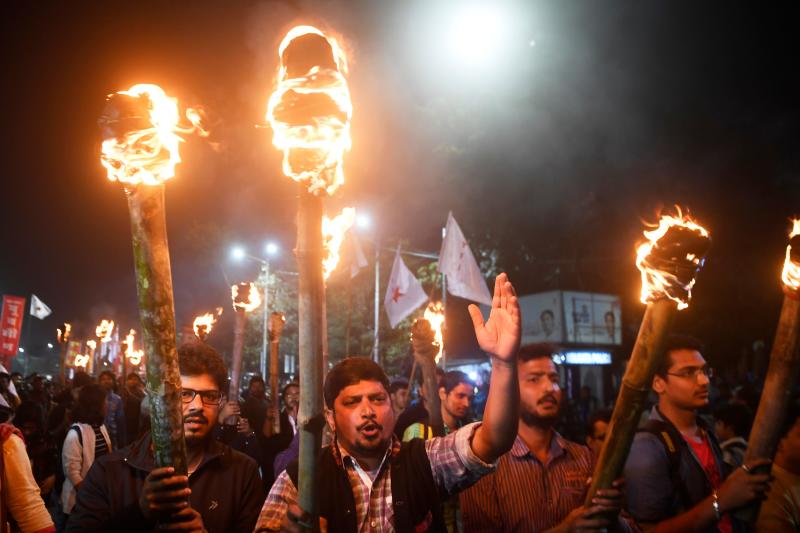Modi govt won't back down on India's contentious citizenship law amid fresh protests
Sign up now: Get insights on Asia's fast-moving developments

Members of various leftist student groups take part in a torch rally to protest against India's new citizenship law in Kolkata on Dec 17, 2019.
PHOTO: AFP
NEW DELHI (BLOOMBERG, AP) - India's Home Minister Amit Shah defended his government's new religion-based citizenship law as he addressed business leaders for the first time since protests against the legislation erupted across the country, hours after violent clashes broke out in the capital New Delhi between police and protesters.
Mr Shah helped shepherd the Citizenship Amendment Act, that bars undocumented Muslims from neighbouring Pakistan, Bangladesh and Afghanistan from seeking citizenship while allowing migrants from other religions.
Since the law was passed last Wednesday, protests against it began spreading across the nation leading to concerns that Prime Minister Narendra Modi and Mr Shah may be appealing to their right-wing Hindu base at the cost of India's cooling economy.
"When the country was divided on the basis of religion and the minorities are being persecuted there in the name of religion, then will you not give them your citizenship?" Mr Shah said on Monday evening in comments broadcast on Times Now, referring to the partition of India in 1947. "Where will they go?" he said, ruling out any possibility of repealing the law.
Yet, the new law is seen as a precursor to Mr Shah's plan to implement a nationwide citizens register to weed out illegal migrants.
Demonstrations first began in the eastern state of Assam where there are fears the new law would allow an influx of migrants from neighbouring Bangladesh. Some 1.9 million people in Assam - many of them Muslims - risk losing their Indian citizenship after the state enforced the citizens register in August.
Anger against the new law soon spread across many parts of India, including the capital New Delhi, over the discriminatory nature of the new law and fears it would damage India's traditional secular ethos enshrined in its Constitution that treats all religions on a par.
India's Supreme Court on Wednesday (Dec 18) postponed hearing pleas challenging the constitutionality of the new citizenship law. The court said it would consider the pleas on Jan 22.
On Wednesday, the authorities tightened security restrictions, implementing a curfew in the north-eastern state of Assam, where ongoing protests have disrupted daily life in Gauhati, the state capital. They also restricted assembly in a Muslim neighbourhood in New Delhi where demonstrators torched a police booth and several vehicles on Tuesday.
If the protests continue to gather steam, there are fears it will distract the government from its economic problems and undermine efforts to attract foreign investment. Asia's third-biggest economy is growing at its slowest pace in more than six years and unemployment is the highest in more than four decades.
Mr Shah told industry leaders in Mumbai on Tuesday that the Modi government is working towards fixing a temporary economic slowdown and that the economy should cover ground in three quarters.
Mr Shah, whose interview was broadcast at the Times Network India Economic Conclave in Mumbai, got support from at least one executive.
"The idea of a strong India is important and it is sad that the students are getting sucked into politics," said Mr Sajjan Jindal, chairman of JSW Steel before Mr Shah's speech. "This law will protect the country from illegal immigrants."
The last time Mr Shah addressed business leaders in Mumbai, billionaire Rahul Bajaj spoke to say corporate India was hesitant about criticising the current government.


